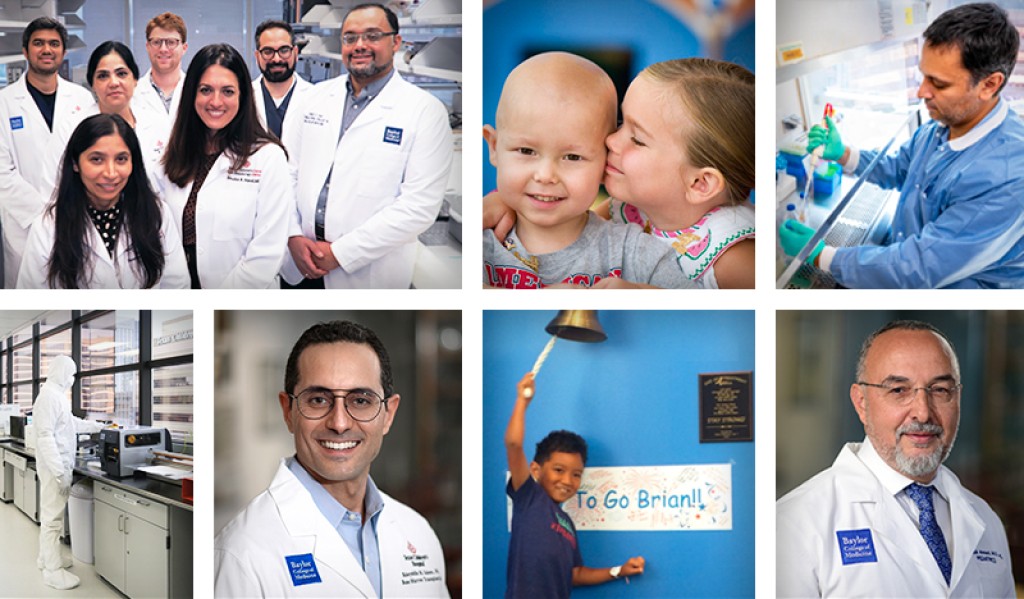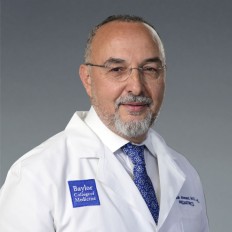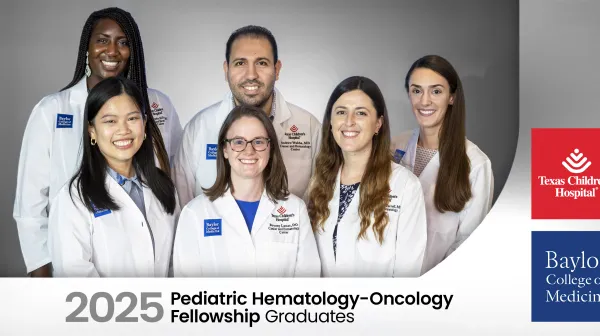
Image caption: Texas Children’s is a hub for multi-disciplinary childhood cancer research and home to world-class expertise and facilities for cell and immunotherapies. Featured in this article are Drs. Hegde and Navai (top left panel, front row, L-R), Dr. Salem (bottom, second panel from left) and Dr. Ahmed (bottom right panel).
While the history of immunotherapy can be traced back nearly a century, the past decade has seen a series of impressive breakthroughs. These advancements have enabled the approach to be applied to fight a variety of cancers – from lymphomas to sarcomas.

Several key breakthroughs are thanks, in part, to Texas Children’s Hospital, which is a leader in clinical research into new and effective therapies to children and young adults. “Over the past 10 years, we have initiated and hosted over 35 new interventional clinical trials focused on advancing new immunotherapies,” said Shoba Navai, MD; Associate Director, Outpatient Clinical Division, Texas Children’s Cancer and Hematology Center; Assistant Professor, Baylor College of Medicine.
“At the Center we are privileged to have the resources necessary to design, optimize and lead first-in-child clinical trials for targeted immunotherapies – efforts that are improving the lives and outcomes of children diagnosed with these cancers,” add Dr. Navai.
While current treatments cure more than 80% of children with cancer in the U.S., they can also leave survivors with lifelong challenges and complications. As a targeted therapy, immunotherapy is especially promising because it has the potential to be less toxic than traditional treatments. Because of this, Texas Children’s anticipates that, in the coming decades, immunotherapies will be increasingly used to treat childhood cancers.
Bringing innovative therapies to trial
With 250 active trials and over 40 research laboratories, the Center is at the forefront of precision medicine and cellular immunotherapy. “A really great benefit of doing cellular immunotherapies here is that we have an expert regulatory team, which mediates the extensive approvals required by the U.S. Food and Drug Administration and other agencies. We also have highly specialized in-house facilities to manufacture cellular therapeutics,” says Dr. Navai.
These unique in-house capabilities include a Good Manufacturing Practices-certified facility, which enables the large-scale synthesis of clinical-grade product for use in Phase 1/2 clinical trials. “In addition to this, we also have a viral vector processing facility, which further helps accelerate the time it takes to move therapies from the lab to the clinic,” adds Dr. Navai.
Overcoming treatment resistance and recurrence in leukemia
Immunotherapies have been key to the dramatic improvements seen in the treatment and curing of childhood leukemias. These include acute lymphoblastic leukemia (ALL), which accounts for around 75 to 80% of cases. Despite this progress, recurrent ALL remains the leading cause of childhood cancer death.
To address this issue, a team at the Center is developing an innovative immunotherapy that targets three ALL-specific antigens: CD19, CD20 and CD22. The project is being led by co-Principal Investigators, Drs. Nabil Ahmed and Baheyeldin Salem at Texas Children’s and Baylor College of Medicine, where they are appointed as Professor and Assistant Professor, respectively, in the Department of Pediatrics, Section of Hematology/Oncology.

“We know the most common cause of ALL relapse after immunotherapy: the loss of the CD19 antigen on the leukemia cells,” says Dr. Ahmed. “So by simultaneously targeting two other antigens known to be present on ALL cells, we believe – and our preclinical data supports this – that we can stop these cancers from returning or evading treatment.”
The project has received regulatory approval to begin enrolling children with recurrent or refractory leukemia, and is listed at clinicaltrials.gov as the CAR-T Cell, B-cell Acute Lymphoblastic Leukemia (TriCAR) trial.
Immunotherapies for sarcoma
While immunotherapy is now a standard treatment for various types of leukemias and lymphomas, for sarcomas the approach is still largely experimental and has shown limited efficacy.
To address this, a novel therapy, which was first developed at Texas Children’s Cancer Center in 2010, is now available through the clinical trial known as PBTC-059. The therapy involves reprograming a patient’s own immune T cells to recognize HER2, a tumor protein expressed in multiple types of childhood cancer, and relies on a technology known as a chimeric antigen receptor (CAR) T-cell therapy.

“One of two patients with a complete treatment response is still in remission seven years later,” Dr. Navai said of a study published earlier this year in Nature Cancer. Dr. Navai serves as Texas Children’s Principal Investigator on the trial, while the National Study Chair is Dr. Meenakshi Hegde, an Associate Professor in the Department of Pediatrics, Section of Hematology/Oncology, at Baylor College of Medicine.
“Now, in partnership with the Pediatric Brain Tumor Consortium, we’re testing the next generation of this therapy in children with recurrent or progressive ependymomas. It’s the first national cellular therapy trial for pediatric brain tumors,” adds Dr. Hegde. This multi-site trial allows patients in the U.S. and Canada to receive this cutting-edge therapy closer to home.
While immunotherapies may not yet be top of mind when referring oncologists seek care for their patients with solid tumors, Dr. Hegde advises colleagues to be aware that centers like Texas Children’s are actively working on new therapies for which trials may be available.
“Our investigators are happy to talk with oncologists, patients, and families about new therapies and clinical trials that may be available,” Dr. Hegde said. “Additionally, insurance carriers are now more likely to approve coverage for these clinical trials. It’s not as big of a barrier as it once was.”
To learn more, visit the Texas Children’s Immunotherapy Program.





